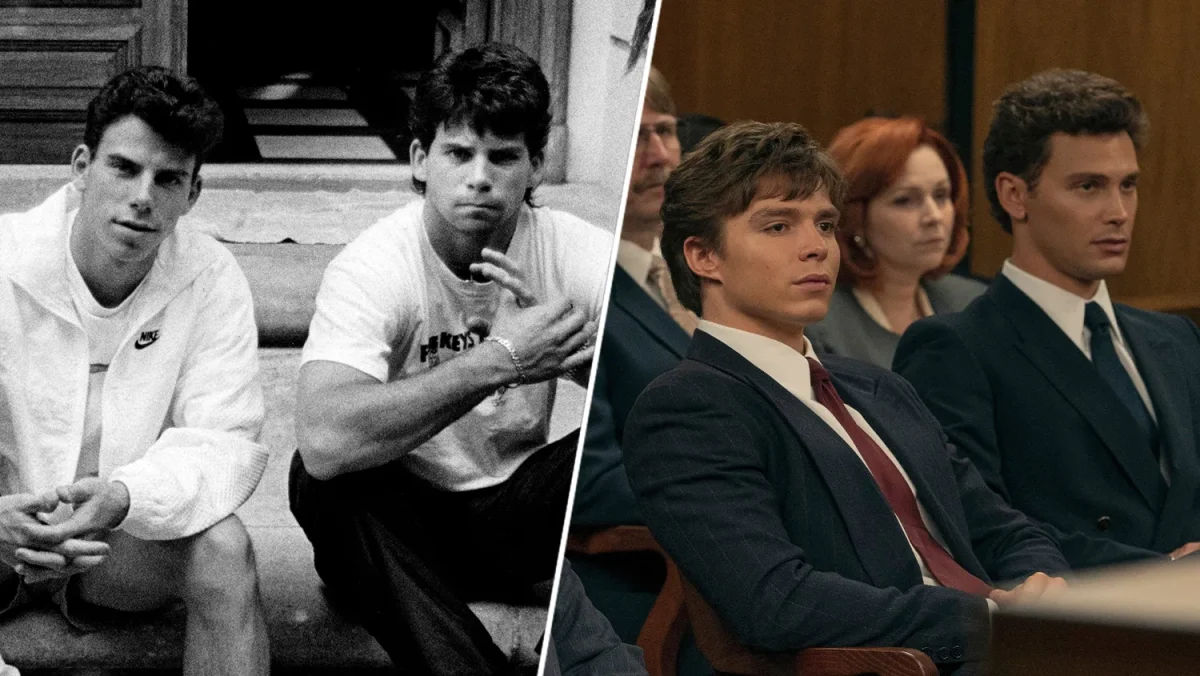In the game of chess, each move is calculated and thought out. The steps are taken with a deliberate outcome in mind, giving purpose to every pawn and rook. But outside of this complex game, in a real-world setting, a series of plays can lead to a much darker conclusion—one that the public never saw coming. Such was the case of the Menendez brothers, who were depicted as calculated killers for the shooting of their parents, José and Kitty Menendez, leaving the world to wonder how a seemingly normal family could unravel so tragically.
The gruesome crime scene became a common household topic in the ’90s, as every California family discussed the eerie and devastating murders of José and Kitty Menendez, which were yet to be solved. However, the Menendez case has resurfaced on the internet due to the recent release of Monsters: The Lyle and Erik Menendez Story, directed by Ryan Murphy and Ian Brennan. On August 20, 1989, 21-year-old Lyle Menendez and his 18-year-old brother Erik Menendez broke into their Beverly Hills home and shot their parents. Many were shocked by the brothers’ coping mechanisms, as they publicly mourned the loss of their parents’ deaths but soon after inheriting their fathers millions embarked on an extravagant shopping spree, purchasing items like Lyle’s Porsche and Erik’s custom Jeep Wrangler. For several months, investigators were left with no leads or suspects other than a possible Mafia attack because of José’s ties to the mob. However, the case broke open with Erik’s confession to his psychologist, Jerome Oziel. After the brother’s confession, Oziel’s mistress, Judalon Smyth, reported the murder to the police, and the brothers were arrested.
Once they were arrested, the brothers revealed a new narrative that complicated the prevailing view that they were greedy killers motivated by their parents’ wealth. Lyle and Erik confessed that they had endured severe emotional, mental, and sexual abuse from their father José. Lyle was subject to his molestation from age six to eight, but Erik endured the sexual assault throughout his entire childhood and into his early adulthood. Monsters goes into graphic detail of the abuse and their mother’s decisions to observe and never intervene. Lyle and Erik argued that the murder of José and Kitty was for self-protection purposes and that killing them was the only way out of the cycle of abuse in the Menendez house. Leslie Abramson, Erik’s defense attorney, fought strongly for her client and tried to show the public how they weren’t the real monsters in the situation. The trial ended in a mistrial, as the jury was unable to reach an agreement. In the 1995 retrial, the brothers were not allowed to give their testimony on the years of abuse they experienced. In 1996, both Lyle and Erik were found guilty of first-degree murder, sentenced to life in prison with no possible parole.

Despite their convictions, the case has remained a controversial topic, with public opinion split. Some believe that the brothers are lying about their abuse, while others are sympathetic with their accounts of torture at the hands of their father. During the trial, there was some evidence that suggested possible child abuse by José, such as perverted photos and a confession from a relative, but nothing was substantial enough to prove Lyle and Erik killed the parents because their lives were at risk. The show has sparked debates about abuse, self-defense, and proper justice.
Many viewers believe that Murphy’s production of the Menendez story is extremely skewed. Although the show covers the extent of their abuse, viewers came to the conclusion that Lyle and Erik are still seen as brutal murderers through the lens of the show. USA Today wrote that the Menendez family made a statement addressing the show as “a phobic, gross, anachronistic, serial episodic nightmare.” Actors Nicholas Chavez and Cooper Koch both remarked that their portrayal could never truly summarize the complexities of the case. Though the actors have come out openly discussing the possible inaccuracies of the show, Ryan Murphy has yet to address the perspective of the show. Additionally, many people have questioned whether Monsters glamorizes the brothers. This same issue arose in the first season of the series Monster: the Jeffrey Dahmer Story. The obsession with the Menendez show has consumed every platform of social media; it is hard not to see Nicholas Chavez on your screen at least once a day. People have become frenzied over the Menendez characters, but most people place the blame on Murphy for fostering a sense of romanticism in a very heavy and convoluted case.
However, the reemergence of this case online has led to new discussion and possible political action. Netflix just released a documentary The Menendez Brothers, where Lyle and Erik were interviewed and gave their own perspective decades later. Pamela Bozanich, the prosecutor in the 1995 case, comments in the documentary on the significant impact of TikTok and social media on the case: “The only reason we are doing this special is because of the TikTok movement to free the Menendez Brothers. If that is how we are going to try cases now, why don’t we just have a poll? You present the facts and everybody gets to vote on TikTok…your beliefs are not facts. They are just beliefs.” The media has had such an influence on the case that it has made people question the role of public opinion in the justice system, whether within the courtroom or beyond.
From the ’90s to now, the Menendez case is still a controversy that sparks heated debate. Monsters has reignited the fire of public interest, causing many to reconsider deciding between believing the brothers to be murderers or victims. Despite the several issues viewers have discovered within the series, the show brings up larger societal issues about the justice system in America. As the lines between truth and fiction continue to blur, people today are still grappling with the question of who the real monsters are.
















































































































































